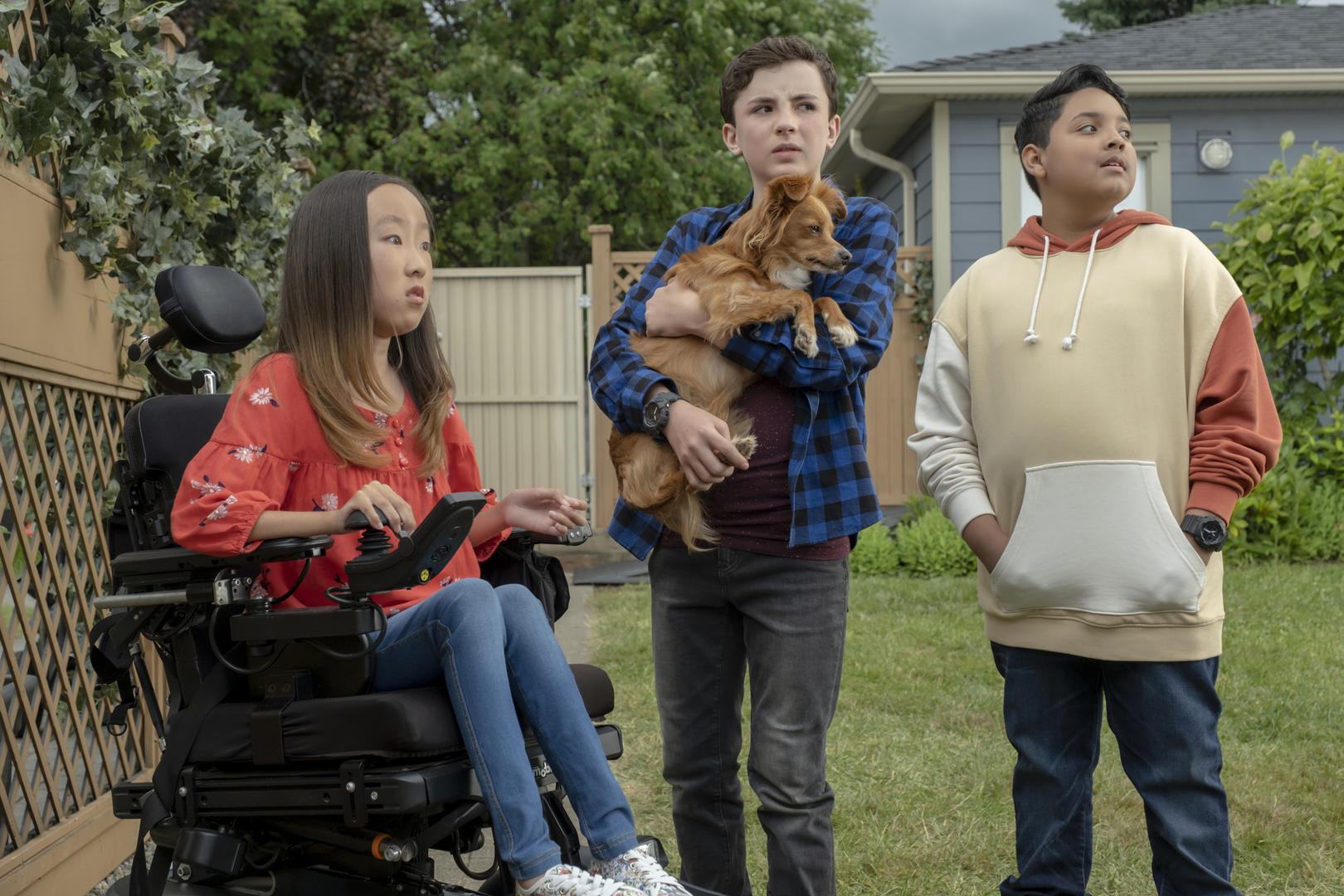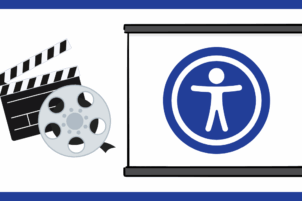The Healing Powers of Dude Premieres on Netflix, Jan. 13, 2020
Los Angeles, Jan. 13 – With one-in-five people having a disability in the U.S. today, the lack of representation – just 3.1 percent on screen and even less in children’s television (less than one percent) – means that millions of people are unable to see themselves in media today. A new show premiering today is bucking that trend. The Healing Powers of Dude, a family comedy about Noah (Jace Chapman), a middle schooler with social anxiety disorder, premieres on Netflix.
Its creators have lofty but achievable goals – to give kids who have anxiety a vehicle to tell their parents how they feel and to “overcome the stigma of talking about mental illness.”
“The more families and friends can talk about this issue, the better the chance people can get the help they need,” creators Erica Spates and Sam Littenberg-Weisberg told RespectAbility.
Spates and Littenberg-Weisberg created The Healing Powers of Dude based off of true events in Sam’s family, allowing viewers to have the unique opportunity to experience what life is like for Noah as he goes through his daily activities. According to the National Alliance on Mental Illness (NAMI), anxiety is classified as the most common health disorder in the U.S. Although general anxiety is classified as normal, anxiety disorders are more difficult to cope with. Eighteen percent of adults and eight percent of children in the U.S. have an anxiety disorder.
In addition to the character of Noah, his best friend Amara uses a wheelchair. The character of Amara is “fearless to help push Noah outside his comfort zone,” said Spates and Littenberg-Weisberg. “There are disabilities you can see, like someone in a wheelchair, and those you might never know about, like anxiety. We decided this could be a great opportunity to show kids and families the struggles people face on both sides, as well as challenge some of the prejudices and misconceptions people have.”
Ninety-five percent of characters with disabilities are played by actors without those disabilities. Amara, however, is played by Sophie Kim, an eleven-year-old with muscular dystrophy who has used a wheelchair since she was four years old. The production team committed early on to finding a young actress who uses a wheelchair, holding a nationwide search to find Sophie, and then adapting the role to her real-life experiences. “Representation is very important to us, as well as to Netflix,” said Spates and Littenberg-Weisberg. “We understand the power of seeing yourself represented in media and that the more you see it, the more it can become commonplace… [Casting Sophie] was one of the best decisions we made making this show. There was never a moment where Sophie didn’t show up to set ready to slay her scene. Nothing about her disability ever hindered production in any way.”
The show had a team of consultants. RespectAbility worked closely with the show on the character of Amara. “Working with RespectAbility has been an incredibly eye-opening experience,” said Spates and Littenberg-Weisberg. “Not only did they give us helpful notes on scripts to make sure we were representing Amara accurately, the people at RespectAbility were kind enough to share their own experiences and anecdotes to include in our scripts.”
Read more from our interview with Erica and Sam below the trailer.
1. How did you draw upon your personal experiences to create this series?
Sam’s younger brother, Noah, has social anxiety disorder and had a hard time transitioning to middle school because of it. With the help of his family, a therapist and some new friends, Sam’s brother finally was able to attend school full-time. This was a very difficult period for Sam’s family, but banding together to help Noah only made them closer and stronger.
2. The viewer is able to experience what life is like for Noah as he goes through his daily activities. What do you hope viewers will gain from this?
There is no better way to understand another person’s struggles than to see things from their point of view. We chose to use visuals to help viewers understand the severity of Noah’s anxiety. So instead of just seeing a boy looking uncomfortable while kids pet his dog, you see a visualization of Noah’s anxiety manifested as zombies swarming around him. We want people to understand how severe this disorder can be and that it should be taken seriously.
3. How did you decide to make Noah’s best friend Amara someone with a physical disability? Why was that important to you?
When we set off to create the perfect friends for Noah we knew one of them had to be fearless to help push Noah outside his comfort zone. We then thought about how there are disabilities you can see, like someone in a wheelchair, and those you might never know about, like anxiety. We decided this could be a great opportunity to show kids and families the struggles people face on both sides, as well as challenge some of the prejudices and misconceptions people have.
4. 95% of characters with disabilities are played by actors without those disabilities. Amara is played by Sophie Kim, an eleven-year-old with muscular dystrophy who has used a wheelchair since she was four years old. Why was it important to cast authentically?
First off, there is no one who could play Amara besides Sophie because she just embodies this character. But beyond her amazing acting, Sophie brought authenticity to the part, and even helped us make sure we were being accurate with Amara. There were moments on set where Sophie told us she was unsure of a line and we worked with her to rewrite it until she felt comfortable. We were also just so excited to discover a young actor in a wheelchair and possibly give them their first job. Representation is very important to us, as well as to Netflix. We understand the power of seeing yourself represented in media and that the more you see it the more it can become commonplace.
5. Noah’s emotional support dog, Dude, adds a comical element to the series. Tell us more about the motivation behind showing how an emotional support dog can be beneficial for people with disabilities while also making clear the difference between emotional support and service animals?
We mention on the show that Noah sees a therapist for his social anxiety disorder and his parents get Dude through the help of that therapist. The idea being that Noah needs something comforting to help calm him down when his anxiety is starting to skyrocket and a dog with the right demeanor can do just that. We decided, along with two of our other consultants (one of whom is a psychologist who works with children), that the role Dude was playing was best defined as an emotional support animal. Dude is there for Noah to hold or pet as a way to comfort Noah, and not a service dog who is specifically trained to perform specific tasks. In our show, Noah’s parents get permission from the school board, so that Noah can attempt to go to school again with the help of Dude.
6. How do diversity and inclusion inform the production?
Diversity and inclusion are always at the forefront of our minds when casting and hiring department heads and crew members. We not only want what you see on screen to reflect the diverse world we live in, we also want our work environment to reflect it as well.
7. How has RespectAbility inspired your work?
Working with RespectAbility has been an incredibly eye-opening experience. Not only did they give us helpful notes on scripts to make sure we were representing Amara accurately, the people at RespectAbility were kind enough to share their own experiences and anecdotes to include in our scripts.
8. Can you share an example of how working with RespectAbility has informed your vision for this production?
In one of our episodes, Amara volunteers to go distract Noah’s neighbor. Upon reading the script, RespectAbility pointed out that this could be a good “teaching moment” since not every house would be accessible for wheelchair users. So we made a point to have Amara react to the steps leading up to the door and how Simon — after a failed attempt to lift her wheelchair — has to ring the doorbell for her.
9. What are your goals for The Healing Powers of Dude?
For kids who have been struggling with anxiety, but didn’t know what it was or how to communicate it to their parents, to be able to point to this show and say, “this is how I feel.” And to also overcome the stigma of talking about mental illness. The more families and friends can talk about this issue, the better the chance people can get the help they need.
10. Who is your targeted audience?
Families! We wrote this so that parents can enjoy the heart and the humor along with their kids.
11. What are the key viewer takeaways that you’d like to see?
Be kind to others and don’t be afraid of people who are different from you.
12. What do you see as the future of disability-inclusive children’s and family programming?
While Noah’s best friend, Amara, is in a wheelchair, we made sure to write her as a normal teenage girl. We do have a few storylines that address some of her struggles, but those were not at the forefront. It would be amazing if writers and producers could see beyond an actor’s disability. It’s important to educate viewers on different disabilities, so we can all better understand them, but it’s also important to show that a person isn’t defined by their disability and they really aren’t that different from those without one.
13. What message would you like to send to producers, writers and directors about creating stories with characters with disabilities, or working with actors with disabilities?
Television, especially children’s programming, is the perfect way to introduce kids to characters that may be different than them. Or even more importantly, let kids at home see someone just like them and feel less alone. Some writers, who do not have a disability, may be afraid to write on the subject because they have no personal experience with it. But all great writers do their research and there are so many organizations, like RespectAbility, to assist in making sure they get things right. As far as casting actors with disabilities, it was one of the best decisions we made making this show. There was never a moment where Sophie didn’t show up to set ready to slay her scene. Nothing about her disability ever hindered production in any way.
14. What advice do you have for people with disabilities wanting to work in this industry?
Make connections and build a community of people who are working toward the same goals. Everything takes time, so be persistent. And if you’re an actor I would suggest writing something that you can star in.
15. Is there anything else you’d like to say to our audience?
We hope The Healing Powers of Dude will first make you laugh, second make you feel hopeful and third give parents a show they actually want to sit down and watch with their kids.









Hi! I was reading this, and I noticed that Sophie was listed as 11 years old. But I think that she was actually 13 when this was published, as she was born in 2006 and is in 8th grade now. Sorry if I’m incorrect or wasted your time, just wanted you to know <3